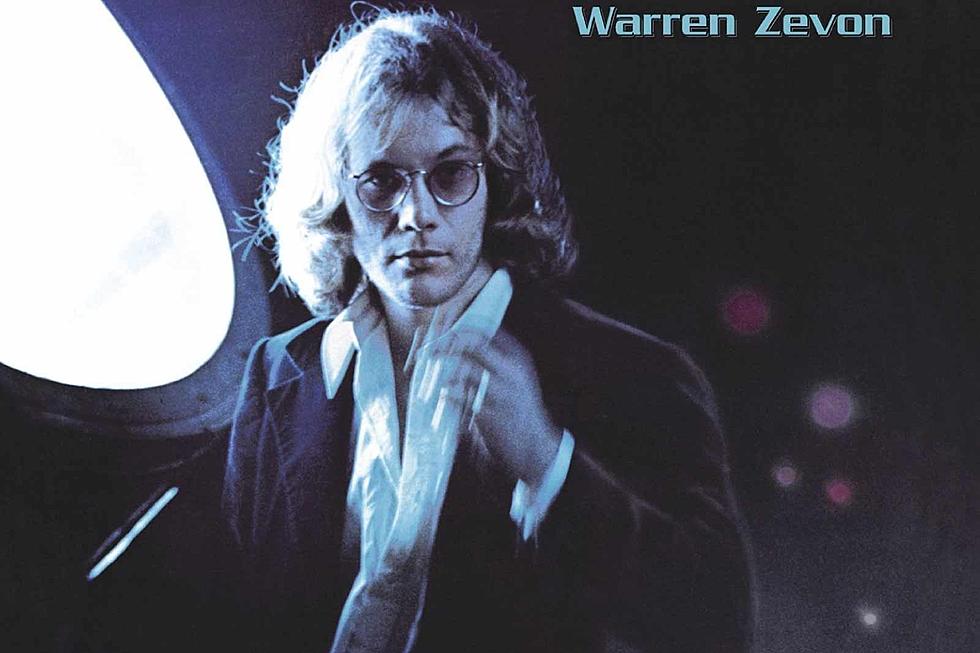
45 Years Ago: Warren Zevon Announces Himself on Self-Titled LP
Warren Zevon was already a decade into a recording career when he released his breakthrough self-titled album in May 1976. But for every purpose the second LP under his name could have been Zevon's debut. It was certainly laid out that way.
The singer-songwriter first released a record as part of the duo Lyme and Cybelle in 1966, reaching the Top 70 with "Follow Me." After a few years as a studio musician and songwriter for hire, he released his debut solo album, Wanted Dead or Alive, in 1969. It bombed.
He spent the next several years working with the Everly Brothers, together and individually, slowly building his song portfolio in his downtime. By 1975, thanks to those compositions, Zevon's reputation had grown to the point where he had amassed an important group of fans and supporters – including Jackson Browne, Linda Ronstadt and members of Eagles and Fleetwood Mac.
When he moved to Los Angeles in 1975 and began work on the album that would become his first for a major label, Zevon stayed with Lindsey Buckingham and Stevie Nicks, who were just starting to experience fame for the first time themselves as new Fleetwood Mac recruits after years of performing and recording. They joined Zevon in the studio, as did Phil Everly, Glenn Frey, Don Henley, Bonnie Raitt and the Beach Boys' Carl Wilson. Browne produced, played piano and contributed slide guitar to the album.
Listen to Warren Zevon's 'Poor Poor Pitiful Me'
Many of Los Angeles' greatest session musicians of the era were also present, but even with all that star power surrounding him, Zevon remained the center of things, supplying piano, guitar, arrangements and 11 songs to an album that sounded like a lifetime coming.
And in many ways, Warren Zevon was indeed that. Although he was well known among his songwriter peers and the music industry at large, Zevon really had no presence at all in the public eye. Even Ronstadt's celebrated covers of several Zevon songs – "Hasten Down the Wind," "Carmelita" and "Poor Poor Pitiful Me," all from this LP, among them – wouldn't arrive until after Warren Zevon's release.
So, expectations weren't all that high, and, frankly, the album didn't sell all that well, peaking at No. 189 and staying on the chart for just two weeks. But Warren Zevon served as announcement of a new singer-songwriter whose voice and songs were worth hearing. Some of music's biggest names were already behind Zevon, and the album's track listing now reads like a classic lineup of some of his greatest songs.
Listen to Warren Zevon's 'Frank and Jesse James'
Unlike so many of his peers and contemporaries (especially Browne, perhaps his biggest supporter and the prince of '70s singer-songwriterisms), Zevon wasn't a particularly sensitive soul, even if his melodies occasionally pushed toward that direction. He was biting. He was sarcastic. And he wrote about some truly abhorrent people.
His characters were drug addicts, alcoholics, prone to violence and gambling with their lives in ways that just happen to also affect those around them. In the album-closing "Desperados Under the Eaves" he sings, "Still waking up in the mornings with shaking hands ... / Don't the sun look angry at me?" That about sums it up. But like the protagonists of the opening track, "Frank and Jesse James," Zevon was the eternal outlaw, "ridin', ridin', ridin'."
And that's the overriding spirit of Warren Zevon that more or less shaped the rest of his career. His next album, Excitable Boy, again produced by Browne and featuring an all-star roster of friends, climbed to the Top 10 – thanks in part to the fluke hit "Werewolves of London." But he never got there again with the almost dozen records he made before his death in 2003.
That 1976 album was a bellwether moment in many ways. It firmed Zevon's status as one of the era's best but often neglected artists, while also turning a mirror on both artist and his scene. Few had his eye and intellect, both of which seemed to surface fully formed here. But the real path was longer and more twisty than that. Ten years after his debut, he finally arrived.
Top 200 '70s Songs
More From Ultimate Classic Rock









